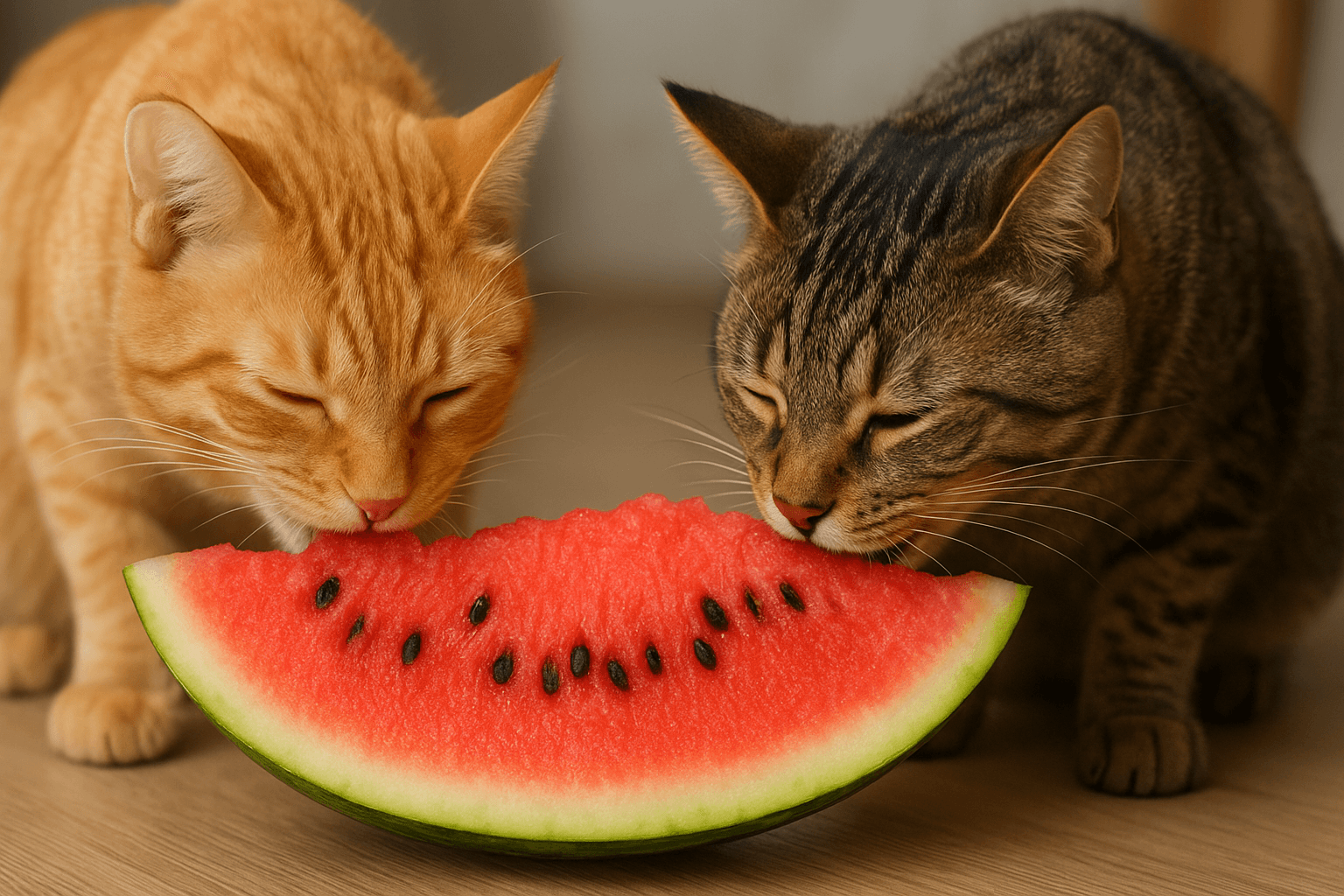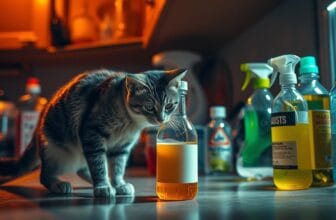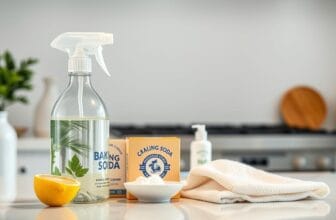
Table of Contents
Ever thought if the calming essential oils could harm your cat? The world of essential oils and cat safety is complex.
Essential oils are popular for aromatherapy and wellness. But, many cat owners don’t know the dangers they pose. Keeping cats safe is crucial, and knowing about essential oil dangers can prevent health issues.
It’s not just a warning—it’s a serious issue for pet owners. Cats are very sensitive to essential oils. Even a little bit can be dangerous.
This guide will teach you about essential oils and their effects on cats. It will help you make your home safe for your pet.
Understanding the Relationship Between Essential Oils and Cats
Essential oils are popular in homes, but they’re risky for cat owners. Cats are very sensitive to these strong plant extracts because of their biology.
Cats handle chemicals differently than other pets. This makes them very vulnerable to essential oils. Their liver can’t break down some compounds, which is a big health problem.
What Are Essential Oils?
Essential oils are strong plant extracts. They’re made by pressing or steam distillation. These oils have strong smells and health benefits.
- Extracted from flowers, herbs, and trees
- Highly concentrated plant substances
- Used in aromatherapy and home fragrancing
Why Cats Are Different from Other Pets
Cats can’t break down some chemicals like dogs or humans. This is because of their liver. Their grooming habits also increase their risk of getting sick from oils.
“A cat’s metabolism is uniquely sensitive to certain chemical compounds, making essential oils potentially lethal.” – Veterinary Toxicology Research
The Science Behind Cat Sensitivity
Cats can’t process essential oils because of missing liver enzymes. This means even a little oil can harm them. It can damage their liver and cause brain problems.
It’s important to know this to keep your cat safe from harmful oils.
The Rising Popularity of Essential Oils in Home Use
Essential oils have become very popular in homes lately. They are used for relaxation, cleaning, and personal care. Millions of families now use these natural plant extracts every day.
The rise in home aromatherapy is exciting but also brings challenges. People love these oils for many reasons:
- Stress reduction
- Natural room fragrance
- Potential mood enhancement
- Alternative cleaning solutions
But, pet safety is a big concern. Not all essential oils are safe for pets. Some oils that are good for humans can harm cats.
“With great aromatic power comes great responsibility” – Modern Aromatherapy Enthusiast
The global essential oils market is expected to grow to billions of dollars. This shows how much people want these products. Brands are making more specific products for homes.
When you try essential oils, think about your pet’s safety first. Knowing the risks is as important as enjoying the benefits of these natural oils.
Why Essential Oils Dangerous Cats: Understanding the Risks
Essential oils might seem safe for humans, but they’re a big risk for cats. Cats are very sensitive to these oils because of their body’s special makeup. This makes them more likely to get sick from liver problems and absorbing oils.
It’s key to know about these dangers to keep your cat safe. Cats can’t break down some chemicals in essential oils because they lack certain liver enzymes.
Liver Enzyme Deficiency in Cats
Cats have a special liver system that can’t handle many substances. Their metabolism is different, making them more at risk when they’re exposed to essential oils.
- Cats can’t break down phenolic compounds well
- Their liver doesn’t have the right detox tools
- Essential oils can build up to toxic levels fast
Sensitivity to Phenolic Compounds
Phenols in essential oils are especially bad for cats. These compounds can harm cells and overwhelm your cat’s body.
Multiple Absorption Routes
Essential oils can get into a cat’s body in many ways, making them more toxic:
- Inhalation: Cats can breathe in diffused oils
- Skin absorption: Direct contact with oils
- Ingestion: Licking or grooming exposed areas
To keep your cat safe, you need to understand how they absorb oils. And you should limit their exposure to harmful essential oils.
Common Essential Oils Toxic to Cats
Pet owners need to be very careful with essential oils around cats. Some aromatherapy products can be harmful to cats. Cats are more at risk because of their unique body chemistry.
Some essential oils are very dangerous and should not be used in homes with cats:
- Tea tree oil
- Peppermint oil
- Cinnamon oil
- Citrus oils
- Eucalyptus oil
- Wintergreen oil
- Pine oils
- Clove oil
These oils can cause serious problems in cats. Cats can’t break down certain chemicals in essential oils. This makes even a little bit very dangerous for them.
Even diffusing these oils can create potential health risks for your feline companions.
The amount of these harmful substances matters a lot. Undiluted essential oils are especially dangerous. They can cause serious health issues right away or later on. Symptoms can range from mild breathing problems to serious organ damage.
Always talk to your vet before using new aromatherapy products at home. This is especially important if you have cats. Keeping your pets safe is the best way to avoid these dangers.
Signs and Symptoms of Essential Oil Poisoning in Cats
Essential oil toxicity is a big risk for cats. Spotting poisoning symptoms early is key to saving your pet. Knowing the signs of essential oil toxicity helps you act fast in emergencies.
Cat owners must watch out for essential oil exposure. Symptoms depend on the oil type and how much they’ve been exposed to.
Immediate Symptoms to Watch For
- Excessive drooling
- Sudden vomiting
- Tremors or muscle weakness
- Unsteady walking (ataxia)
- Difficulty breathing
- Lethargy or extreme weakness
Long-term Health Effects
Long-term exposure to essential oils can cause serious problems. These include:
- Liver damage
- Respiratory system complications
- Neurological disorders
- Potential organ failure
When to Seek Emergency Care
If you see any poisoning symptoms, get help right away. Call your vet or an emergency animal hospital if your cat has:
- Persistent vomiting
- Labored breathing
- Sudden behavioral changes
- Signs of extreme distress
Remember: Quick response can be lifesaving in cases of essential oil toxicity.
Getting your cat to a vet quickly can prevent long-term damage. Always put your cat’s health first when using essential oils at home.
Different Types of Oil Diffusers and Their Impact

When looking at essential oil diffusers, cat owners need to know the key differences. Not all diffusers are safe for your feline friends during pet-friendly home fragrancing.
Choosing the right diffusion method is crucial for cat-safe aromatherapy. Different diffusers spread oils in unique ways. This can greatly affect your cat’s health.
- Passive Diffusers
- Reed Diffusers: Lowest risk, minimal oil dispersion
- Heat Diffusers: Moderate risk, concentrated oil release
- Personal Evaporative Diffusers: Limited area coverage
- Active Diffusers
- Nebulizing Diffusers: Highest risk, microdroplet emissions
- Ultrasonic Diffusers: Moderate to high risk, widespread oil distribution
Active essential oil diffusers are the biggest danger for cats. They turn oils into tiny particles that can be breathed in or absorbed by your cat’s sensitive system.
Protect your feline companion by choosing diffusion methods that minimize direct oil exposure.
When picking essential oil diffusers, think about your cat’s safety first. Look at where you place them, how much oil they use, and how they spread it. This way, you can make your home fragrant without harming your cat.
Safe Distances: Proper Placement of Diffusers
Creating a cat-friendly home means being careful with essential oils. Your pet’s safety depends on where you place diffusers and knowing the risks. Cats are more sensitive to essential oils than other pets, so we need to be extra careful.
To use essential oils safely, set clear rules in your home. Cats are very sensitive to essential oils. So, it’s important to place diffusers in the right spots for their safety.
Strategic Room Selection
When picking a room for your diffuser, follow these tips:
- Choose rooms with good air flow
- Make sure there are many ways for your cat to leave
- Put diffusers where your cat can’t get to them
- Keep diffusers away from where your cat sleeps
Ventilation Requirements
Good air flow is key when using essential oils near cats. Here’s how to ensure it:
- Open windows to let air move
- Use fans to help air circulate
- Only use the diffuser for a little while
- Watch how your cat acts while and after using the diffuser
Remember: No essential oil is completely safe for cats. Always put your pet’s health first and talk to a vet about any risks.
Professional veterinarians say to be very careful with essential oils in homes with cats.
Concentration Levels: What’s Too Much?
It’s important for pet owners to know about essential oil dilution. This knowledge helps keep their cats safe. Cats are very sensitive to strong essential oils. So, it’s key to use oils safely around them.
Essential oils can be very dangerous for cats. Even a little bit of undiluted oil can harm them a lot. Vets say it’s crucial to follow strict rules to keep cats safe from these oils.
- 100% pure essential oils are never safe for cats
- Dilution is key to reducing potential health risks
- Professional guidance is essential before using any essential oils around cats
When using essential oils with cats, be very careful. Most vets say to dilute oils a lot. You should mix only a few drops of oil with a lot of carrier oil or something else to diffuse it.
“When it comes to cats and essential oils, less is always more.” – Veterinary Aromatherapy Specialists
Every cat is different, so what’s safe for one might not be for another. Always talk to your vet about using oils safely in your home. They can tell you what’s best for your pet.
Alternatives to Essential Oils for Cat Owners
Creating a pleasant home doesn’t mean risking your cat’s health. Pet owners can find many safe alternatives to essential oils. These options provide lovely fragrances without harming your cat.

Looking for pet-safe air fresheners? Here are some natural options that make your home smell great and keep your cat safe:
- Herb-based room sprays using cat-friendly aromatherapy ingredients
- Simmer pots with safe herbs like rosemary and mint
- Beeswax candles with light, natural scents
- Fresh flower arrangements in well-ventilated areas
Natural Fragrance Options for Feline-Friendly Homes
Your cat’s safety is key when choosing home fragrances. Natural options like dried lavender sachets, cedar chips, and citrus-free botanicals offer gentle scents. These won’t overwhelm your cat’s sensitive nose.
Here are some cat-friendly ways to keep your home smelling fresh:
- Regular cleaning and ventilation
- Using activated charcoal to absorb odors
- Selecting unscented, pet-safe cleaning products
- Maintaining clean litter boxes
By using these pet-safe air fresheners, you can make a welcoming home. This will keep you and your cat happy and healthy.
Emergency Response: What to Do If Your Cat Is Exposed
If your cat is exposed to essential oils, act fast. Move your cat away from the source safely. Make sure the area is well-ventilated to provide fresh air.
Dealing with cat emergencies needs a clear plan. Look out for these signs of essential oil exposure:
- Difficulty breathing
- Excessive drooling
- Weakness or lethargy
- Tremors or unsteady movement
- Vomiting or changes in behavior
Time is of the essence in cases of potential essential oil poisoning. Don’t try home remedies or wait for symptoms to improve. Call your vet or a pet poison control center right away.
When you call for help, have this info ready:
- Type of essential oil involved
- Estimated amount of exposure
- Duration of exposure
- Your cat’s current symptoms
- Your cat’s weight and age
Professional veterinary help is the best way to protect your cat from long-term health issues.
Have your vet’s number and the ASPCA Animal Poison Control Center (888-426-4435) on hand. Quick advice from experts can greatly help your cat’s recovery from essential oil exposure.
Prevention Tips and Safety Measures
To keep your cat safe from essential oils, you need to plan ahead. Start by understanding the dangers and making your home safe for your pet.
Preventing harm begins with how you store and handle essential oils. Make your home a safe space by controlling where these oils are used.
- Store all essential oils in locked cabinets or high shelves
- Keep diffusers in rooms inaccessible to cats
- Use child-proof containers for oil storage
- Avoid using essential oils in areas where cats frequently rest
To create a safe area for your cat, you need to add layers of protection. Set up certain areas in your home where essential oils are not allowed.
| Prevention Strategy | Implementation |
|---|---|
| Physical Barriers | Use baby gates or closed doors to restrict cat access |
| Ventilation Control | Ensure rooms with diffusers have excellent air circulation |
| Product Selection | Choose pet-safe alternatives when possible |
Always put your cat’s safety first when using essential oils. Watch how your cat reacts and be ready to remove any harmful substances right away.
Being careful is the best way to protect your cat from essential oil dangers.
Special Considerations for Multi-Pet Households
Using essential oils in homes with many pets needs careful planning. Each pet is different, and cats are especially sensitive. They can face health risks from certain smells.

To keep cats safe in homes with other pets, you must plan carefully. The layout of your home and how pets interact are key to keeping them safe.
Protecting Cats in Shared Living Spaces
Here are important steps to keep cats and dogs safe from essential oils:
- Make some areas off-limits to pets for essential oil use
- Use baby gates to keep cats away from diffusers
- Make sure there’s good air flow in shared spaces
- Watch how pets act after introducing new smells
Managing Different Pet Sensitivities
Every pet reacts differently to their environment. You need to be flexible and adjust your approach for each pet.
| Pet Type | Essential Oil Sensitivity | Recommended Precautions |
|---|---|---|
| Cats | High | Avoid direct exposure, use minimal concentrations |
| Dogs | Moderate | Limited exposure, diluted oils only |
| Birds | Extreme | Complete separation from essential oils |
Always remember, prevention is better than treatment when it comes to keeping pets safe from essential oils.
Debunking Common Essential Oil Myths
Pet owners often face many false beliefs about essential oils and cat health. Knowing the truth about essential oils can keep your cat safe. Online, many myths about essential oils and cats spread, confusing pet owners.
Here are some common myths about essential oils and cats:
- Myth: All natural products are safe for cats
Natural doesn’t always mean safe. Cats can’t handle many essential oils because of their unique body chemistry.
- Myth: Small amounts of essential oils won’t harm cats
Even a little bit of essential oil can hurt cats. Their liver can’t break down these oils well.
- Myth: Diffusing essential oils is completely harmless
Keeping essential oils diffusing can be toxic for cats. It can cause breathing problems and other health issues.
“Cats are not small humans or dogs – they process substances differently and require specialized care.” – Veterinary Toxicology Expert
Knowing the truth about pet aromatherapy means understanding cats’ unique bodies. Cats can’t break down many essential oil compounds. This makes them very sensitive to these oils.
| Myth | Reality |
|---|---|
| Essential oils are always safe | Potentially dangerous for cats |
| Cats can tolerate small oil exposures | Even minimal contact can cause serious health issues |
| All natural products are pet-friendly | Natural does not equal safe for cats |
By clearing up these myths, you can make a safer home for your cat. Always talk to a vet before adding new things to your cat’s space.
Professional Guidance: When to Consult Your Vet
Keeping your cat healthy means getting regular vet advice and check-ups. It’s important to check for essential oil risks to keep your cat safe from chemicals.
Your vet is key in handling essential oil risks. They help you understand and lower these risks. They also check your home for any dangers.
When to Schedule a Veterinary Consultation
- After initial essential oil exposure
- During annual wellness examinations
- If you notice any unusual behavioral changes
- Before introducing new home fragrances
Risk Assessment Strategies
Vets can create plans to lower essential oil risks. They will:
- Evaluate your cat’s specific health profile
- Discuss home environment details
- Recommend safe alternative products
- Provide personalized guidance
Early action and prevention are vital for your cat’s health. Regular vet visits help you make the best choices for your pet’s safety.
Conclusion
As a cat owner, your main goal is to keep your pet healthy and safe. Essential oil safety is more than just being careful—it’s about making your home safe for your cat. Essential oils can be very dangerous for cats.
Being a responsible cat owner means choosing safe products for your home. You need to think about how every item might affect your cat’s health. Essential oils might be safe for people, but they can harm cats because of their special metabolism.
It’s important to be aware and take action. Always talk to a vet before bringing new things into your home. By focusing on your cat’s health and knowing the dangers, you can make a safe space for them.
Preventing problems is always better than fixing them. By learning about essential oil safety, you can greatly improve your cat’s health and happiness.
FAQ
Are all essential oils dangerous to cats?
Not all essential oils are toxic to cats, but many can be harmful. Cats can’t break down essential oils like humans do. Oils like tea tree, peppermint, citrus, and eucalyptus are especially risky.
How can cats be exposed to essential oils?
Cats can get exposed to essential oils in several ways. They can touch them, breathe them in, lick them, or get them from surfaces. Their grooming habits make them more likely to absorb oils through their skin and fur.
What are the first signs of essential oil poisoning in cats?
Early signs include feeling tired, drooling, vomiting, and trouble walking. They might also shake or have trouble breathing. If you see these signs, call your vet right away.
Can I use essential oil diffusers if I have cats?
It’s best to avoid using essential oil diffusers with cats around. If you must use them, make sure the room is well-ventilated. Keep the diffuser out of your cat’s reach and make sure they have a safe space.
Are some essential oil diffusers safer than others?
Passive diffusers like reed diffusers are safer than active ones. But, no diffuser is completely safe for cats.
What should I do if my cat is exposed to essential oils?
Get your cat away from the area and wash their fur. Then, call your vet or an animal poison control center. Don’t try to make them vomit unless a vet tells you to.
Are there cat-safe alternatives to essential oils for home fragrance?
Yes, you can use baking soda or activated charcoal to absorb smells. Pet-friendly air purifiers are also good. Fresh herbs or candles safe for pets can also make your home smell nice.
How long do essential oil toxins remain in a cat’s system?
How long toxins stay depends on the oil and how much they were exposed to. Some effects can last days or weeks. Liver damage can be long-term. It’s important to watch your cat closely.
Can essential oil poisoning be fatal for cats?
Yes, it can be fatal if not treated quickly. The danger depends on the oil, how much, and for how long. Quick vet care is key to avoid serious problems or death.
How can I protect my cats from essential oil exposure in a multi-pet household?
Make sure there are pet-free areas for essential oils. Store them on high shelves or in locked places. Always have good air flow. Choose safe ways to make your home smell good for all pets.
SOurces:
1. What to Know About the Risks of Essential Oils for Cats – WebMD
https://www.webmd.com/pets/cats/risks-of-essential-oils-for-cats aspca.org+7webmd.com+7petpoisonhelpline.com+7
2. Are Essential Oils Safe for Cats? – PetMD
https://www.petmd.com/cat/are-essential-oils-safe-cats petmd.com+1aspca.org+1
3. Essential Oils for Cats: Are They Safe? – Hill’s Pet Nutrition
https://www.hillspet.com/cat-care/routine-care/essential-oils-for-cats hillspet.com
4. Essential Oils and Cats ? (Reddit r/CatAdvice)
https://www.reddit.com/r/CatAdvice/comments/14aomep/essential_oils_and_cats/ thesprucepets.com+10reddit.com+10webmd.com+10
5. The Essentials of Essential Oils Around Pets – ASPCA
https://www.aspca.org/news/essentials-essential-oils-around-pets tisserandinstitute.org+11aspca.org+11achs.edu+11
6. Essential Oils and Cats – Pet Poison Helpline
https://www.petpoisonhelpline.com/blog/essential-oils-cats/ self.com+8petpoisonhelpline.com+8hillspet.com+8
7. Cats and Essential Oil Safety – Tisserand Institute
https://tisserandinstitute.org/cats-essential-oil-safety/ aspca.org+11tisserandinstitute.org+11achs.edu+11
8. What Every Single Pet Owner Needs to Know About Pets and Essential Oils – SELF
https://www.self.com/story/pets-essential-oils-diffusers en.wikipedia.org+9self.com+9petpoisonhelpline.com+9
9. Are Essential Oils Dangerous to Cats? – The Spruce Pets
https://www.thesprucepets.com/dangers-of-essential-oils-555089 webmd.com+3thesprucepets.com+3thesprucepets.com+3
10. Is Lavender Dangerous for Cats? Learn the Risks and Safety Tips – The Spruce Pets
https://www.thesprucepets.com/is-lavender-safe-for-cats-7602701 thesprucepets.com+1reddit.com+1







